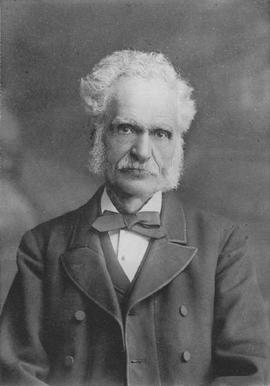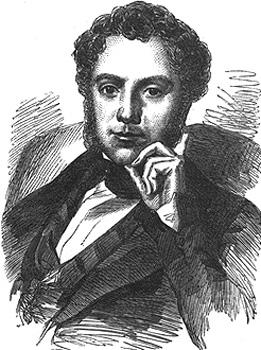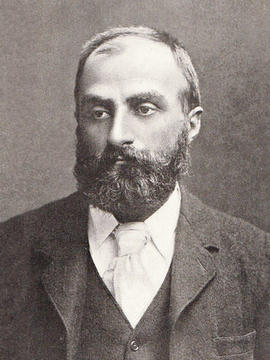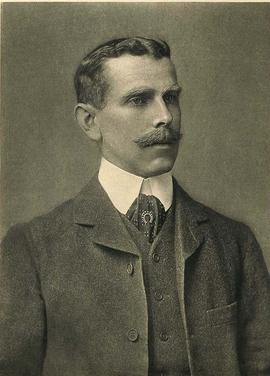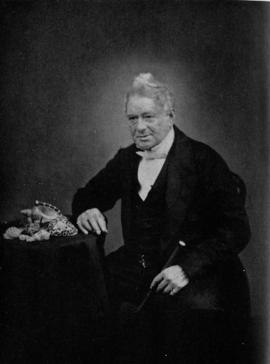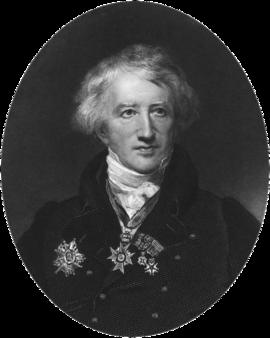Morton Allport was an English-born Australian colonial naturalist. His work added largely to the knowledge of the zoology and botany of Tasmania. He was an authority on Tasmanian fish and catalogued, described and drew pictures of his specimens. He was a leader in the introduction of salmon and trout to Tasmanian waters and also introduced the white water-lily and the perch. He was a Fellow of the Linnean Society of London and of the Zoological Society of London. He was vice-president of the Royal Society of Tasmania
Sir Samuel White Baker was and English explorer, officer, naturalist, big game hunter, engineer, writer and abolitionist. He also held the titles of Pasha and Major-General in the Ottoman Empire and Egypt
Henry Walter Bates was an English naturalist and explorer who gave the first scientific account of mimicry in animals. He was most famous for his expedition to the rainforests of the Amazon with Alfred Russel Wallace, starting in 1848. Wallace returned in 1852, but lost his collection on the return voyage when his ship caught fire. When Bates arrived home in 1859, he had sent back over 14,712 species (mostly insects) of which 8,000 were (according to Bates) new to science. Bates wrote up his findings in the work The Naturalist on the River Amazons
William John Broderip was an English lawyer and naturalist. Broderip throughout his life was an enthusiastic collector, particularly of shells. His collection was ultimately purchased by the British Museum. He was elected a Fellow of the Linnean Society in 1824, of the Geological Society in 1825, and of the Royal Society on 14th February 1828. In co-operation with Sir Stamford Raffles he aided the formation of the Zoological Society of London, of which he was one of the original Fellows
William Spiers Bruce was a British naturalist, polar scientist and oceanographer who organised and led the Scottish National Antarctic Expedition to the South Orkney Islands and the Weddell Sea
John Samuel Budgett was a British zoologist and embryologist. He spent most of his short career on the genus Polypterus (bichir), found in the lakes, river margins, swamps and floodplains of tropical central and western African and the Nile River system. He died to blackwater fever shortly after his return to England. This happened on the very day that he was suppose to deliver a lecture of his work to the Zoological Society of London. He didn't have time to write a report, but he did leave a full set of drawings and specimens. It was left to his friend and colleague John Graham Kerr to interpret them and write the report
Hugh Cuming was an English collector who was interested in natural history, particularly in conchology and botany. He has been described as the 'Prince of Collectors'. Born in England, he spent a number of years in Chile, where he became a successful businessman. He used the money he saved to buy a ship that was specifically built for collecting specimens, and travelled extensively on collecting trips amassing many thousands of specimens. After his death, much of his material was bought by the Natural History Museum. A number of species are named after him
Robert Oliver Cunningham was a Scottish naturalist. In January 1866 he was appointed Professor of Natural History in the Royal Agricultural College, Cirencester, but resigned in June in consequence of being appointed by the Admiralty upon the recommendation of Joseph Dalton Hooker, to collect plants as naturalist on board HMS Nassau. His natural history notes and narrative of the voyage was published in 1871 as The Natural History of the Straits of Magellan. In all, Cunningham published 18 scientific papers before 1872, his first which was about gannets was his theses but the others were mainly on his observations from the voyage of the Nassau. He presented some of these papers to the Zoological Society of London and to the Linnean Society. In 1871 Cunninham was appointed Professor of Natural History at Queens College, Belfast where he spent the following 31 years as a university teacher
A French naturalist and zoologist, sometimes referred to as the 'founding father of palaeontology'. Cuvier was a major figure in natural sciences research in the early 19th century and was instrumental in establishing the fields of comparative anatomy and palaeontology through his work in comparing living animals with fossils
Charles Robert Darwin was an English naturalist, geologist and botanist, best known for his contributions to the science of evolution. Darwin published his theory of evolution with compelling evidence in his 1859 book On the Origin of Species. His five-year voyage on HMS Beagle established him as an eminent geologist whose observations and theories supported Charles Lyell's conception of gradual geological change, and the publication of his journal of the voyage made him famous as a popular author. In 1871 he examined human evolution and sexual selection in The Descent of Man, and Selection in Relation to Sex, followed by The Expression of the Emotions in Man and Animals (1872). His research on plants was published in a series of books, and in his final book, The Formation of Vegetable Mould, through the Actions of Worms (1881), he examined earthworms and their effect on soil

